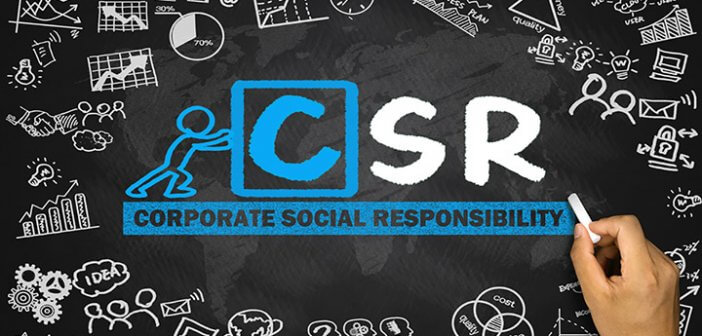Guest Article by Sanjay Gora, AGM, SAIL and Gold Medalist in Journalism, in Governance Democracy & Politics Magazine, Special Issue on CSR “Responsible Institutions of India 2016″, (Views expressed are personal)
One often hears that our company has been doing CSR work much before the term came into vogue. That defines the first issue that one comes across while communicating about CSR.
What all is covered under CSR
The term CSR has been so overused now that there are people who get irritated when this is used in meetings and conferences. They get the impression that CSR is just a sham and a show-off. Companies do one small thing and spend ten times more on getting publicity for it. There might be some truth in it, as there is no smoke without fire. But painting the whole CSR ecosystem with one brush seems unfair. There are people who are doing genuine and responsible CSR for years. There are some who do it silently, and then there are others who don’t mind publicity. That brings us to the second question.
Should PR be doing CSR publicity
This is more of a question of ethics in Indian context. We have this belief that good and charitable work should be done silently and without making much noise. There are sayings like, one hand should not know that the other hand is donating. In such a social setting, companies doing CSR have to think twice before publicizing their CSR activities. Corollary to this is that Public Relations is for image building. So a company, which is only fulfilling its corporate social responsibility (CSR), deciding to use the CSR initiatives for image building is a bit awkward. One can’t claim extra credit for doing what one is supposed to, now mandated to do. Though we can justify CSR publicity on the grounds that many are not doing even basic CSR. So the ones doing good CSR should be allowed to highlight it, as it may inspire others to follow the lead.
Why employees excluded from CSR?
While communicating for CSR, one often encounters questions from peers like, “Our company is doing so much CSR for others, why can’t our campus playground, sports facilities and other infrastructure be built under CSR.” Logical answer seems to be that these are employee welfare measures and should be covered under that. But there are hurdles which prevent such facilities being created through non-CSR funds. So it seems quite logical that employees’ families are also part of the social responsibilities of a company and CSR funds could be used for providing facilities to them. I am sure many of the readers might have faced similar situations and comments. With fast changing policy and regulatory environment, maybe this will become a reality some day.
Is advertising expenditure on CSR part of CSR expenditure
This is another question, which we came across many a times while planning for CSR advertising campaigns. Though it has been a while for me when I directly handled such campaigns, I think the question still remains unanswered. I am aware that some print publications allow special discounted advertising rates for socially relevant messages but that is a different issue. With interpretations and CSR rules varying from time to time, I think even now the advertising expenditure on CSR is incurred from general advertising budget and not from funds available for CSR. A senior executive from a news channel had mentioned few months back that it is allowed and he would show me the circular but I am waiting till now.
CSR Awards Drama
Awards and award functions are dime a dozen now. Every other day, there is one award function or another. Most media houses, publications, lobbying firms, institutions have entered this business now. Field of CSR has also not remained untouched. One feels like comparing it to creative advertising awards. There are creative campaigns for awards, many of which are not aired or printed. And then there are some regulatory advertisements which are stipulated by law. Advertising targeted at potential customers is a different segment. So there appears to be CSR for awards, CSR for mandatory requirements and then CSR for CSR. It is very difficult to distinguish between these categories. In my view, the race for awards has diminished the importance and significance of genuine CSR.
The puzzle of unspent CSR budgets
We have plenty of orphans in the country who would love to have a family, and there is a long list of parents who are waiting to adopt a child. The unspent CSR budget is a puzzling fact. No one would believe that there is a shortage of areas where CSR funds can be utilized. Still in many organizations, CSR funds remain unspent. I asked a friend who is in CSR and he explained that so many NGOs and other organizations have mushroomed now salivating for CSR funds that it is very difficult to zero down on genuine beneficiaries. It is a painstaking process which obviously takes time and in many cases one finds that bonafides of the applicant are doubtful. That is the other side of the coin, as is always the case.
Dearth of CSR Professionals
While scanning newspapers for potential job opportunities, I am observing for last 2-3 years that there has been a sudden increase in the number of vacancies arising for CSR professionals. These are entry level and mid-level vacancies, which require specific qualifications and experience. A case of digging a well after the house catches fire. It seems new laws and policies over last couple of years have woken up the companies to the importance of CSR and now they are hiring CSR professionals right, left and centre. Good for youngsters and good for the CSR function, because after 5-6 years, there will be a pool of professionals who have been born and brought up in CSR function, so to say. Till now, CSR used to be a stop gap department for mid-career professionals.
Responsibility vs. Liability Mindset
As is the case with most functions, a job done with passion leads to superior results. A job done for job remains just that. For CSR to become a passion, the mindset needs to change. It needs to be accepted as a responsibility and not a liability. Though mandating fixed percentage seems contradictory to the concept of responsibility, but it was essential to drive home the point that CSR has to be an integral part of organization functioning. The day CSR moves from a liability to a responsibility mindset, we will see remarkable results.
Public Relations & CSR
With PR emerging as a significant component of overall business strategy for every progressive organisation, PR set-ups have a very important role to play in publicising the socially responsible activities of companies, albeit in a subtle, unobtrusive way. Advertising such activities is often looked at with condescension as mentioned earlier.
What is important is that it is always impressive if the praise comes from others. But, if we presume that the good work will get noticed in the long run, then we are living in utopian world, cut off from realities. PR of the good deeds done by the companies, then, is letting the world know, in a subtle, unassuming manner, about its socially responsible activities.
The role of PR in “getting the right mileage” out of well-intentioned acts of goodwill, cannot be denied. In fact, there is absolutely no harm in doing so, if one does it to acquaint and apprise both, internal and external entities, about the community support activities being done by an organisation.
Besides creating awareness, PR support can even play a contributory role by highlighting a company’s various ongoing projects and campaigns, especially in the initial stages. CSR, by definition, is a continuing activity, and is not done in jerks and starts, though some organisations practice it when they feel that their brand image needs some boost. But, if organisations remember/care for employees and their surrounding community during good times, chances are that the good times will prevail forever. Even if bad times fall upon such organisation, the public may tend to ignore one or two lapses.
A CEO once aptly remarked: “The basic goal of private enterprise remains what it has always been- to produce goods and services that people need, earn a fair return on their investment, and succeed as an economic institution. But, the new dimension that must be observed- a new “bottom line” for business- is social approval. A successful business organisation must possess a moral sense as well as an economic sense.” As Arthur W. Page once said, “All business in a democratic country begins with public permission and exists by public approval.”
Profit making, or increasing shareholder value, is the prime concern of modern corporations. In such a scenario, certain CSR initiatives having implications on the profitability of the enterprise can be misunderstood and misinterpreted by the stakeholders.
For example, suppose a corporate house procures cost-effective raw material from another firm and under its new CSR policy, it stops procuring the same as the firm was using child labour. Then, questions may be raised over its decision to procure costly raw materials based on its newly-found goodwill streak. At such times, PR has to pick up the gauntlet, and come out with a well thought-out and elaborate strategic plan and put it into action, to succinctly bring out the facts before the public, and to acquaint them with the pros and cons of such decisions.
By opting to publicize its CSR activities through PR, an organisation does what it has not dared to do before: put its actions and plans in the CSR arena, into public domain. It, in a sense, sets benchmarks for itself and for others to follow.
The organisation can neither afford to go back on its publicly proclaimed plans, nor can it not improve upon the existing plans in subsequent years, as the expectations grow incrementally.
With the watchful eyes of the public, and the curious cameras and pens of the media men hungry for stories, CSR has to be practiced very responsibly, literally. Because, at times, actions do speak louder than words.
This article is part of Special Issue of GDP Magazine on CSR. Governance Democracy& Politics (GDP) Magazine’s Special Issue on #CSR Takes A Deep Dive on the state of CSR Spending. It has a regressive database of 5000+ companies on CSR Spending.
Catch your Copy on Stands or Contact at 9718024620 or gdpindia.net@gmail.com





